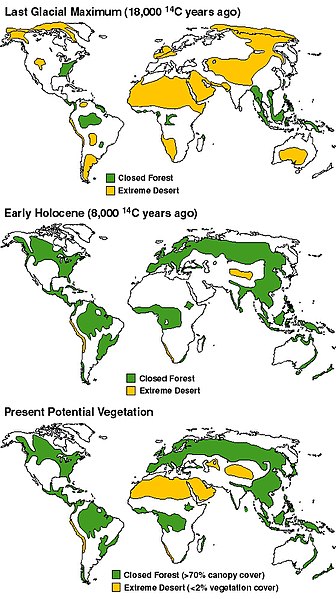Aridity_ice_age_vs_early_holocene_vs_modern.jpg

Size of this preview:
336 × 599 pixels
.
Other resolutions:
135 × 240 pixels
|
558 × 994 pixels
.
| Description Aridity ice age vs early holocene vs modern.jpg |
English:
During the Last Glacial Maximum 14000 years ago, thermal-driven evaporation from the oceans onto continental landmasses was low, causing large areas of extreme desert, including polar deserts (cold but with low rates of precipitation). Greater precipitation today creates a much different distribution of climatic zones, although anthropogenic changes including agriculture prevent forest cover from reaching its theoretical potential. Near the start of the Atlantic Period, 8000 years ago, the world's climate was warmer and wetter than today according to an ORNL estimate.
|
||||
| Date | |||||
| Source | Adams J.M. & Faure H. (1997) (eds.), QEN members. Review and Atlas of Palaeovegetation: Preliminary land ecosystem maps of the world since the Last Glacial Maximum. Oak Ridge National Laboratory, TN, USA. | ||||
| Author | Oak Ridge National Laboratory. Adams J.M. & Faure H. | ||||
|
Permission
( Reusing this file ) |
Not copyrighted as stated at http://www.esd.ornl.gov/projects/qen/nerc.html
|
Captions
Add a one-line explanation of what this file represents

